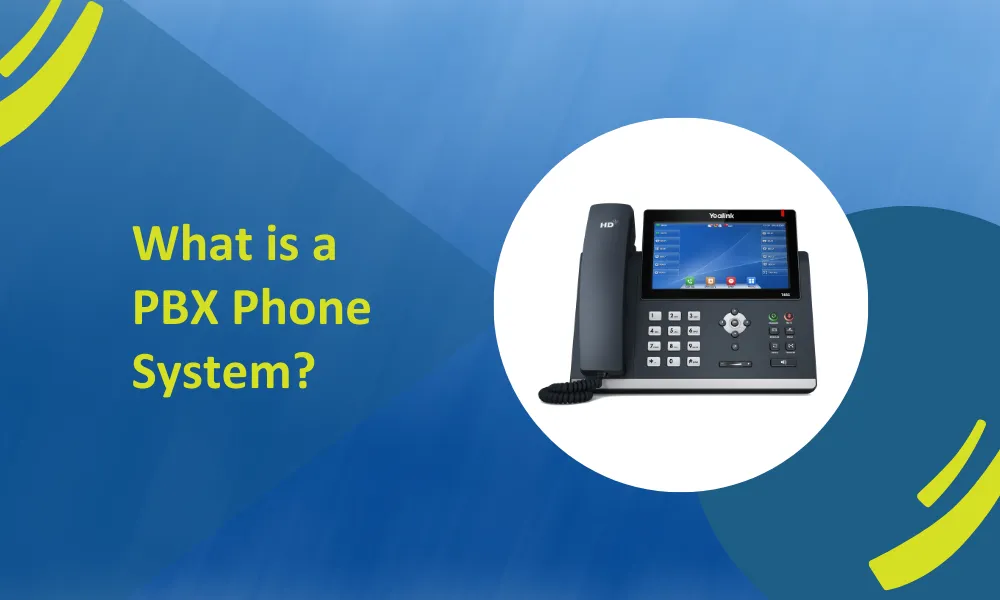A PBX (Private Branch Exchange) phone system is a private telephone network used within a company. It allows multiple users to share a certain number of external lines, making it cost-effective and efficient for internal and external communications. PBX systems route calls through the company’s local network.
A PBX is a phone system that links extension phones in different offices together, allowing employees to communicate easily across locations. It’s great for businesses with multiple sites and offers extra features like improved security and conference calling.
Discover all you need to know about PBX solutions in this guide! Learn the ins and outs of PBX, including the different types, cost considerations, benefits for your company’s cohesion and growth, reasons for needing PBX, and tips for selecting the right one.
What Is a Private Branch Exchange (PBX)?
An exclusive division exchange, or PBX, a special telephone framework utilizing various hardware components to oversee the establishment and directing of calls, enabling users to converse over the telephone through internal lines. A PBX telephone structure, also recognized as a secluded telephone grid or phone system, provides business telecommunication characteristics such as phone conversations, call queues, call forwarding and transfers, voice message, and an automated receptionist. Employing a PBX, the telephone connection entering your company can be divided into numerous lines, enabling you to maintain additional telephones. Furthermore, calls amidst users are complimentary, rendering it a cost-efficient substitute for conventional public switched telephone networks.
Pbx systems help teams connect using internet or phone lines. Pbx divides lines for different departments, including call centers. Pbx allows cost-effective calls on various devices, saving money. Integration with video, chat, and email enhances communication in businesses.
Reasons To Use a PBX
The PBX phone system offers companies many advantages like better calling features and improved security. If you’re thinking about upgrading your communication, here are some reasons to choose PBX.
- Transfer calls with ease: With PBX, calls move easily between departments and people. You don’t have to end a call to transfer it to someone else who can assist the caller.
- Access more call features: A PBX phone system allows more than calls. You can do online meetings and video conferences remotely.
- Enjoy free customization: A PBX phone system helps customize your phone setup. You can add greetings, music, and apps for calls, messages, and conferences on different devices.
- Communicate on the go: A PBX phone system lets you connect using different gadgets like desk phones, computers, laptops, and mobiles. You can call traditionally from any location.
- Connect multiple business locations: The blog is about PBX phone systems and how they connect employees in different places. One system manages calls by forwarding and routing them.
- Gain advanced security: The PBX phone system has encryption to secure conversations. It boosts privacy for companies and clients.
3 Types of PBX Phone Systems
Private branch exchange helps with business communication. The system works on-site and in the cloud. It offers traditional and enhanced telephony options. Here are types to consider for your business.
Analog or Traditional PBX
If an older PBX system is set up at your office. It links internal phones to external phone lines. These lines connect your office to the public phone network.
The analog PBX phone system offers essential telephony services for company employees to make and receive calls and faxes. It involves installing copper phone lines and other necessary hardware. Adding more employees to the network requires new telephone wires and jacks. External calls necessitate paying for extra phone lines.
An on-site PBX phone system links your staff but lacks modern features like media services and remote work.
Internet Protocol PBX (IP PBX)
A PBX phone system is a new type of the old analog PBX, also called an IP PBX or VoIP system. It offers extra features and connects offices in different places. The IP PBX uses the internet protocol to link office-networked phones and converts voice to data, which reaches the receiver as voice. This allows for access to unified communications features such as messaging, video conferencing, and “bring your own device” (BYOD) mobility, as well as many additional phone features such as enhanced security and conference calling, which analog PBX systems lack.
A PBX phone system uses SIP trunking to run phone service on your office network. This allows teams to communicate internally and with clients online. To install an IP PBX, link a SIP trunk with a provider and allocate storage for call data. The session initiation protocol (SIP) is vital for operating an IP PBX as it enables outside communication. Learn more about SIP vs VoIP for additional information.
Cloud PBX
Cloud PBX, also called virtual or hosted PBX, uses the internet (VoIP) for , incoming and outgoing. Setting up a Cloud PBX is easy – buy the service and connect phones. Providers route calls through the internet or a traditional phone network. Cloud PBX, also named hosted PBX, helps with phone communication using VoIP technology. Setting up a Cloud PBX system is fast and simple – get the service and connect phones. Calls go through data packets online or a traditional phone network.

An essential advantage of Cloud PBX lies in its scalability. Businesses possess the ability to effortlessly add or remove phone lines and features as required without the necessity of investing in additional hardware. This adaptability renders it optimal for organizations experiencing fluctuating communication demands.
Furthermore, Cloud PBX provides an array of advanced features such as automatic transcription of voicemails to emails, menus with auto-attendants, call redirection, and integration with various business applications like CRM systems. These functionalities serve to boost productivity and streamline communication procedures within a company.
Moreover, Cloud PBX is known for being reliable. Providers have backup data centers to prevent service disruptions. Cloud PBX is cost-effective and helps businesses communicate easily. This system allows managing call features online, such as forwarding and recording.
What To Look For in a PBX Phone System
When selecting a PBX system, it’s important to choose one that meets specific communication requirements of your company. Consider these key factors to find the right fit for your business.
The Requirements of Your Business
Cloud PBX systems have extra features than on-site ones. If you want advanced functions like call reports, video calls, mobile extensions, and CRM integration, choose a cloud PBX system. For basic call features like transfers, ring groups, and auto attendants, an on-site PBX system is sufficient.
The Environment in Which Your Business Operates
If you work in one place, use an on-site PBX system. For remote workers, a cloud PBX is best. Cloud PBX is good for small to medium businesses; on-site PBX works well for larger companies.
The Strength of Your Company
To know which PBX phone system your business needs, examine your knowledge of telephony concepts, how skilled your IT staff are, which systems you’ll need to integrate and your access to a strong internet connection. For instance, you’ll need a reliable high-speed internet connection to run a cloud PBX system, whereas you’ll only need phone lines to run a traditional small business phone system. Additionally, consider if you need to keep your existing phone numbers and if the PBX system is compatible with your current hardware and software infrastructure. These factors are crucial in determining the strength of your company’s telecommunication capabilities.
Your Budget
PBX systems have costs for setup and upkeep. Cloud PBX needs monthly fees. On-premises PBX includes hardware, installation, licenses, and replacements. VoIP PBX lets you adjust lines for free. Analog setup needs physical installation and extra line costs. Determine the cost of a pbx type for your company’s budget.
Bottom Line
A PBX phone system helps businesses communicate better, aiding growth and success. To choose one, consider your needs and available options.
One important factor to consider is whether you need an on-premise PBX system or a cloud-based PBX system. On-premise PBX systems, also known as traditional PBX systems, require hardware to be installed on-site at your business location, offering you more control over your system but requiring maintenance and updates, resulting in ongoing costs. On the other hand, cloud-based PBX systems, also known as hosted PBX or “cloud phone systems,” are hosted off-site by a service provider, offering scalability, flexibility, and cost-effectiveness with lower upfront costs and monthly subscription fees. Most hosted PBX providers do not require customers to purchase any equipment beyond IP phones, making it a great option for small and medium-sized businesses.
Additionally, you should evaluate the features offered by different PBX systems such as call forwarding, voicemail-to-email transcription, auto-attendant, conference calling, and mobile integration. Understanding your business needs and priorities will help you choose a PBX system that aligns with your communication goals and budget constraints.
Moreover, think about scalability, reliability, security features, customer support, and compatibility when choosing a PBX system. The correct PBX system can improve communication, customer interactions, and productivity in your business.
Frequently Asked Questions
Is PABX the same as PBX?
No. PABX is a private automated branch exchange that can automate calls on a private network without requiring a phone provider.
How do I choose a PBX phone system?
To understand PBX phone systems, start by evaluating your communication needs and budget for upgrades. Next, compare different PBX types based on features, cost, and complexity to decide which suits you best.



